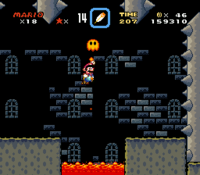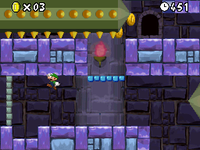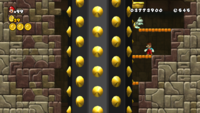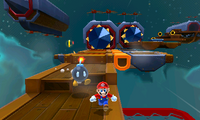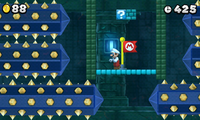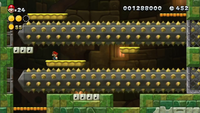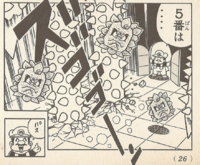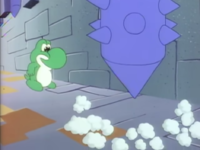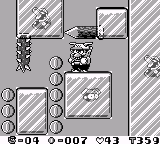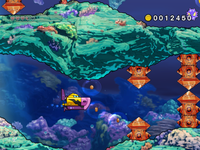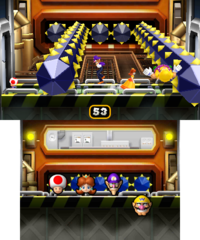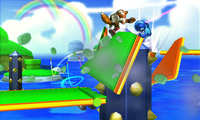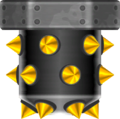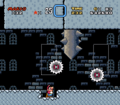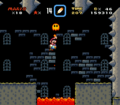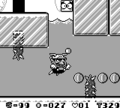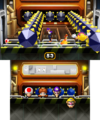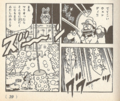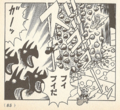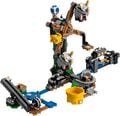Skewer: Difference between revisions
(How about we keep all our yari in one basket? Functionally these are near identical to the WLII thing and only superficially similar to skewers.) |
Tag: Mobile edit |
||
| Line 301: | Line 301: | ||
{{SSBU}} | {{SSBU}} | ||
{{SMM2}} | {{SMM2}} | ||
{{MPS}} | |||
[[Category:Hazardous objects]] | [[Category:Hazardous objects]] | ||
[[Category:Koopa Troop weapons]] | [[Category:Koopa Troop weapons]] | ||
Revision as of 10:20, June 9, 2022
- This article is about the obstacle. For the move in Super Mario RPG: Legend of the Seven Stars, see Skewer (move). For Ridley's special move in Super Smash Bros. Ultimate, see Ridley § Skewer. For the obstacle also called a piston, see jack.
| Skewer | |||
|---|---|---|---|
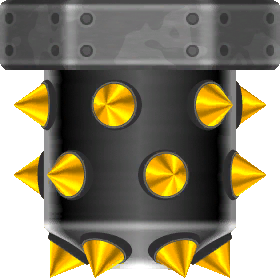
| |||
| First appearance | Super Mario World (1990) | ||
| Latest appearance | Mario Party Superstars (2021) | ||
| |||
Skewers (also known as Spikes[1] and Spike Pillars[2][3]) are gray, blue, black or green metallic pillars with spikes on them, serving as major, indestructible course obstacles. They primarily appear in castle and tower levels, usually later in the game, with some exceptions. First appearing in Super Mario World, their attack patterns are moving in a single direction, either vertically or horizontally, and they can either power-down Mario if they touch him or crush him for an instant life loss. In Super Mario World: Super Mario Advance 2 and later titles, however, the Skewers can only power-down Mario. Unlike some other obstacles of the same manner, Mario can run through them if he is invincible or is undergoing post-damage invincibility frames.
History
Super Mario series
Super Mario World / Super Mario Advance 2
Originally appearing as light gray stone pillars with gray spikes in fortresses and castles, the Skewers are all vertical in Super Mario World and its remake, moving up and down, giving a thud sound and a mini-earthquake as they hit the ground, while also blocking the player's path. The Skewers are solid obstacles that can damage the player upon contact, and they can even cause an instant life loss if the player is caught between a Skewer and the ground. In the Super Mario Advance 2 remake, if Mario is invincible or going in post-damage invincibility frames, he can run through them, unlike other obstacles of a similar nature, and they no longer cause an instant life loss if Mario is caught underneath them. There are usually several of them in a row which have to be timed in order to safely cross them.
Skewers appear as an obstacle, alongside Grinders in #6 Wendy's Castle in the first room; in fact, the very first obstacle in the castle is a slow-moving Skewer that take around 13 in-game seconds between rising and pounding the ground and a Dry Bones, where Mario must time his jump on one of the two Jumping Boards to pass by. In the Super Mario Advance 2 version of Wendy's Castle, an extra Skewer over a pit has been added before the Skewer with the Jumping Boards. A row of seven Skewers that move faster, take around 8 in-game seconds between rising and pounding the ground, then appear, hiding in the ceiling, where Mario must time his running while also avoiding Grinders as he waits for the Skewers to rise. Before the door to the Midway Gate and the second room, three more Skewers appear, the second of them pointing upward and moving in an alternating pattern, and they move very quickly where they take around 3 in-game seconds between rising and pounding the ground. If Mario has activated the switch at the Red Switch Palace, the red ! Blocks make it easier to cross over the second Skewer facing upward. In an early version of the level, more fast-moving Skewers before the Midway Gate were planned to appear.[4]
Skewers are the main obstacles in the Valley Fortress. The first row of seven simultaneous Skewers move slowly, take around 13 in-game seconds between rising and pounding the ground (11 in the Super Mario Advance 2 remake), and give players ample warning by slowly inching out before crushing the ground. In between them, past the first three is a green ! Block. The second set of five move faster, take around 8 in-game seconds between rising and pounding the ground and additionally require players to jump over spikes to pass. Past the Midway Gate, the last set of seven Skewers move very quickly, take around 3 in-game seconds between rising and pounding the ground, and Mario needs to jump over lava and avoid Lava Bubbles in addition to avoiding the Skewers. The last Skewer in the set before the boss door is a Skewer that moves upward, and it moves in an alternating pattern from the first six.
They last appear in Bowser's Castle in door number 5, where a row of 9 of them appear alongside Thwomps, and they take 13 in-game seconds between rising and pounding the ground. The first Skewer is the closest to the ground and the succeeding ones get situated higher until the penultimate and last one, and Thwomps are situated between the Skewers, forcing players to run through them. Unlike Wendy's Castle and Valley Fortress, the Skewers in Bowser's Castle come down slowly, but can still cause an instant life loss if the player gets crushed by them in the SNES version of the game.
Similar obstacles also found in fortresses and castles include the large brown Pillar that appears in auto-scrolling areas and miniature wooden ones without spikes on the sides (resembling pencils) in Chocolate Fortress and #7 Larry's Castle.
New Super Mario Bros.
Skewers return in New Super Mario Bros., which also introduces horizontally moving ones. They are now metallic military green with uniform yellow spikes on the front and sides of them, and they are rendered as static sprites. Due to their material being different, their thuds sound like a metallic gate slamming. They appear only in Template:World-link and Template:World-link, though they are the main obstacles of both levels. Unlike in Super Mario World, they are not treated as solid objects and cannot instantly take out Mario, unless he is small or mini. Shell Mario can also crouch in a Skewer's path without taking damage. Mega Mario can walk past Skewers without taking any damage.
In World 3-![]() Castle, vertical Skewers are the first obstacles encountered in the course, and they are encountered throughout the room, taking approximately 9 in-game seconds to cycle through their patterns. A total of sixteen of them appear in the course. The fifth Skewer goes in the path of the first Star Coin, where Mario must go down to collect it, though he can hide in the crevice to avoid the Skewer. The sixth Skewer faces upward and activates sooner than the seventh one; in between them are Donut Block. Past the checkpoint, Skewers appear past the Whomps, where an upward facing one penetrates through Donut Platforms and the rest appear in a row, smashing the ground at different times and being a mix between downward and upward facing ones. The last three Skewers in the row do not have safe areas, requiring Mario to run through them. An upward facing Skewer is found before the boss door. Finally, the third Star Coin is guarded by spikes and a Skewer.
Castle, vertical Skewers are the first obstacles encountered in the course, and they are encountered throughout the room, taking approximately 9 in-game seconds to cycle through their patterns. A total of sixteen of them appear in the course. The fifth Skewer goes in the path of the first Star Coin, where Mario must go down to collect it, though he can hide in the crevice to avoid the Skewer. The sixth Skewer faces upward and activates sooner than the seventh one; in between them are Donut Block. Past the checkpoint, Skewers appear past the Whomps, where an upward facing one penetrates through Donut Platforms and the rest appear in a row, smashing the ground at different times and being a mix between downward and upward facing ones. The last three Skewers in the row do not have safe areas, requiring Mario to run through them. An upward facing Skewer is found before the boss door. Finally, the third Star Coin is guarded by spikes and a Skewer.
Horizontal Skewers get introduced in World 6-![]() Tower as the first obstacle encountered as well, taking 7 in-game seconds to cycle through their patterns, where they move faster than the ones encountered in World 3-
Tower as the first obstacle encountered as well, taking 7 in-game seconds to cycle through their patterns, where they move faster than the ones encountered in World 3-![]() Castle. A total of eleven are found in the first room. The first Star Coin requires Mario to duck to avoid the fourth, incoming Skewer. The fifth Skewer moves very fast, taking only 3 in-game seconds to cycle, though it stops halfway around the screen unlike the other Skewers. Past the checkpoint flag involves Mario climbing up platforms to avoid a set of three simultaneously moving Skewers. In one segment, Mario needs to use a Trampoline to jump past two Skewers slamming against each other. The second room requires Mario needs to jump up past five Skewers that have a mix of both left and right-facing Skewers, which move in succeeding times past the first. The only appearance vertical Skewers make is in the secret room where the third Star Coin is, mixing with horizontal Skewers and covering the room, leaving some safe spots for Mario to hide in.
Castle. A total of eleven are found in the first room. The first Star Coin requires Mario to duck to avoid the fourth, incoming Skewer. The fifth Skewer moves very fast, taking only 3 in-game seconds to cycle, though it stops halfway around the screen unlike the other Skewers. Past the checkpoint flag involves Mario climbing up platforms to avoid a set of three simultaneously moving Skewers. In one segment, Mario needs to use a Trampoline to jump past two Skewers slamming against each other. The second room requires Mario needs to jump up past five Skewers that have a mix of both left and right-facing Skewers, which move in succeeding times past the first. The only appearance vertical Skewers make is in the secret room where the third Star Coin is, mixing with horizontal Skewers and covering the room, leaving some safe spots for Mario to hide in.
New Super Mario Bros. Wii
Skewers, referred to as pistons in the Prima game guide,[5] make a comeback in New Super Mario Bros. Wii, where their coloration is black and they now spin as they move. In addition, their spikes are patterned through out the pillar rather than uniformly aligned on the front and sides of it. The game introduces a very long and extremely fast Skewer that runs along the floor for the length of a long room in Template:World-link, and very large vertical ones in Template:World-link and Template:World-link. The sound they make is that of a large sliding gate slamming. The three levels are the only appearances of Skewers in the game.
As in New Super Mario Bros., Skewers first get introduced in a water-themed castle level, World 4-![]() Castle, though the ones featured in this level are horizontal Skewers. The first room contains 3 pairs of horizontal Skewers that slam against each other with a cycle of approximately 8 in-game seconds; players need to use fence to climb and avoid them as well as use areas they can safely duck in while the Skewers activate. The second room features six Skewers that slam against walls, with varying speeds. The first Skewer is the slowest one in the room, while the rest are faster, cycling in approximately 5 in-game seconds. Before the Warp Pipe to the third room, a pair of Skewers alternate between their activation. Past the third room, a very long and fast horizontal Skewer shoots through the length of the room; this Skewer makes a warning sound to indicate players when it is going to activate, makes a whirling when it moves, and players can avoid it by ducking or by jumping on moving platforms. This Skewer takes approximately 13 in-game seconds to cycle through.
Castle, though the ones featured in this level are horizontal Skewers. The first room contains 3 pairs of horizontal Skewers that slam against each other with a cycle of approximately 8 in-game seconds; players need to use fence to climb and avoid them as well as use areas they can safely duck in while the Skewers activate. The second room features six Skewers that slam against walls, with varying speeds. The first Skewer is the slowest one in the room, while the rest are faster, cycling in approximately 5 in-game seconds. Before the Warp Pipe to the third room, a pair of Skewers alternate between their activation. Past the third room, a very long and fast horizontal Skewer shoots through the length of the room; this Skewer makes a warning sound to indicate players when it is going to activate, makes a whirling when it moves, and players can avoid it by ducking or by jumping on moving platforms. This Skewer takes approximately 13 in-game seconds to cycle through.
In World 6-![]() Tower, two gigantic vertical Skewers that slam into each other are the main obstacle of the level, where players need to climb the tower while avoiding them. The first giant Skewer faces upward, while the second one faces downward. Similar to the long horizontal Skewer in World 4-
Tower, two gigantic vertical Skewers that slam into each other are the main obstacle of the level, where players need to climb the tower while avoiding them. The first giant Skewer faces upward, while the second one faces downward. Similar to the long horizontal Skewer in World 4-![]() Castle, the two giant Skewers make a warning sound to alert players they are going to activate, and they both make a whirling sound when going up and down. The area where both of them meet is where players can find the Checkpoint Flag. These Skewers take approximately 17 seconds to cycle through their activation. Two Skewers are also featured in the Morton Koopa Jr. boss fight, where they slam in the left and right parts of the stage; these ones move slower than the other Skewers in the game.
Castle, the two giant Skewers make a warning sound to alert players they are going to activate, and they both make a whirling sound when going up and down. The area where both of them meet is where players can find the Checkpoint Flag. These Skewers take approximately 17 seconds to cycle through their activation. Two Skewers are also featured in the Morton Koopa Jr. boss fight, where they slam in the left and right parts of the stage; these ones move slower than the other Skewers in the game.
World 7-![]() Castle features the most Skewers in the game, having a total of 38 Skewers, 6 of them being gigantic Skewers. The first two Skewers encountered in the level are gigantic similar to the ones in World 6-
Castle features the most Skewers in the game, having a total of 38 Skewers, 6 of them being gigantic Skewers. The first two Skewers encountered in the level are gigantic similar to the ones in World 6-![]() Tower, even taking the same amount of time to complete its cycle. The next Skewers are normal-sized, vertical pairs that slam into each other with a cycle of approximately 5 in-game seconds, where one Skewer in the area before the Checkpoint Flag is a very fast one that goes downward, which takes approximately 3 in-game seconds to complete its cycle. Giant Skewers do not appear until past a pair of Sledge Bros., and two of them appear in a hidden Warp Pipe where second Star Coin is located. Past two Skewers slamming against each other is a long line of Skewers, mixed with alternating upward and downward facing Skewers, which activate at the same time with a cycle of 8 in-game seconds. In some places with downward-facing Skewers, marked by the arrow sign, players can duck to avoid them.
Tower, even taking the same amount of time to complete its cycle. The next Skewers are normal-sized, vertical pairs that slam into each other with a cycle of approximately 5 in-game seconds, where one Skewer in the area before the Checkpoint Flag is a very fast one that goes downward, which takes approximately 3 in-game seconds to complete its cycle. Giant Skewers do not appear until past a pair of Sledge Bros., and two of them appear in a hidden Warp Pipe where second Star Coin is located. Past two Skewers slamming against each other is a long line of Skewers, mixed with alternating upward and downward facing Skewers, which activate at the same time with a cycle of 8 in-game seconds. In some places with downward-facing Skewers, marked by the arrow sign, players can duck to avoid them.
Super Mario 3D Land
Skewers from New Super Mario Bros. Wii, referred as Spike Pillars, make a return in Super Mario 3D Land, making their first appearance in a 3D Mario game; they are no longer in castles, instead appearing on two airship levels. They are colored to be dark blue rather than black. Spike Pillars typically face the player to take advantage of the Nintendo 3DS 3D effects, occupy the length of the platform they are shooting out from, and they always give a small movement before they shoot out. In addition, all Spike Pillars make a sound when they are moving. They cannot be destroyed, even while invincible; as Statue Mario or Invincible Mario (including White Tanooki Mario), they are like walls if run into with these powers.
Spike Pillars first appear in Template:World-link, where there are thirteen of them in total and all of them are horizontal. Two of them first appear when the camera angle shifts from overheard to towards the ground to make them visible. They have a 10 second cycle from when they shoot out and retract. Past the Checkpoint Flag and a single, closer, lone Spike Pillar, Mario needs to run past a long, consecutive line of them that activate all at once, though safe parts are marked on the platform that Mario can stay at.
In Template:World-link, Spike Pillars are the first obstacles encountered in the level, where they move faster, taking around 7 in-game seconds to complete their cycle, and additionally take place in an auto-scroll type level. Seven of them appear in the level. Vertical Spike Pillars make their first appearance in this level after the first Star Medal, which feature a downward and an upward-facing Spike Pillar. Horizontal Spike Pillars that slam into the walls are found after the second Star Medal, and these feature Mushroom Trampolines in the Spike Pillars' path that players can use to propel upwards.
New Super Mario Bros. 2
In New Super Mario Bros. 2, Skewers make a reappearance as rare obstacles. However, unlike past New Super Mario Bros. installments, they take their coloration from Super Mario 3D Land, and twenty of them appear only in one, auto-scrolling course, Template:World-link, which is a water-filled course, similar to how the first two installments of the series have Skewers introduced in water-themed courses, and only horizontal Skewers are featured. Skewers in the game can defeat Fishbones. The sounds they make are a lighter clanging than in New Super Mario Bros. Wii. The first appearances of the rows of Skewers are located right next to the Checkpoint Flag halfway through the level, and they move very slowly through the water, taking around 13 in-game seconds when they hit and retract. Two pairs of them hit the walls that enclose the Checkpoint Flag, while two pairs surround the top and bottom parts. Further up the level before the pipe that leads to the boss door, three more pairs of Skewers are encountered, moving quicker through the water than the first, taking 10 in-game seconds to complete their cycle; in this part, players can take cover in between walls to protect themselves from the Skewers. In the secret exit route of the level that requires Mini Mario to access, six Skewers are featured, with the first two being separate Skewers. Later above, two pairs of Skewers that hit each other appear with the moving platforms that can crush the player.
New Super Mario Bros. U / New Super Luigi U / New Super Mario Bros. U Deluxe
Skewers also appear in New Super Mario Bros. U, where they are found in Giant Skewer Tower and the Challenge Mode level 200 Clifftop Coins. All of the Skewers are horizontal and are once again black with gold spikes as in New Super Mario Bros. Wii, and their lengths vary. Just like in preceding New Super Mario Bros. installments, the first appearance of the Skewers are in a water-themed world. In this game, they make a warning sound that they are about to activate and make a whirling sound as they move, similar to the bigger and/or longer variants of the Skewer in New Super Mario Bros. Wii.
In Giant Skewer Tower, eleven of them appear in total, and players are first introduced to two harmless ones designed to be part of the stage background in the level, foreshadowing the rest of the level. In the next area, players need to swim above and past three of them, which have a cycle of approximately 10 in-game seconds and move relatively faster. The first Star Coin and other secrets in this area involves players going behind a wall while dodging the Skewers. The next row of three Skewers are out of the water and involve the player climbing up moving platforms and Note Blocks while finding safe areas to avoid them. Past the Checkpoint Flag, are three more Skewers that players need to time Note Blocks to make past them, though areas with Dry Bones indicate that they are safe spots. The last Skewer before the boss is a longer one than the others and takes longer to complete its cycle, approximately 16 in-game seconds.
In 200 Clifftop Coins, three of them appear in the level while the player is wall-jumping to climb, where they do not give a whirring sound nor make a warning sound, making their behavior similar to their New Super Mario Bros. Wii counterpart. This marks the only appearance in the series where Skewers are not in a Bowser-themed level, including castle, tower, or airship levels.
The Skewers also appear in the New Super Luigi U course, Shish-Kebab Tower, being based off the Giant Skewer Tower course, but they move at faster rates than in New Super Mario Bros. U, taking 2 seconds to cycle through their animations. Vertical Skewers additionally make an appearance here. Players first start in an enclosure surrounded by three pairs of Skewers that slam into each other and the surrounding walls. Past the elevator, players encounter six Skewers, one facing each of the four directions and hitting each other to make a square-shaped safe area, where coins are used to mark the spots that are safe to stand on. Another two Skewers alternate their pattern from the six Skewers and cover the areas on the far right platforms, one of them which guards the second Star Coin. Past the second elevator, three more Skewers are found, the first facing up, the second facing to the left, and the third facing to the right, where the third Skewer hits slightly later than the first two.
Skewers reprise all of the aformementioned roles in New Super Mario Bros. U Deluxe.
Super Mario Maker / Super Mario Maker for Nintendo 3DS / Super Mario Maker 2
Skewers return in Super Mario Maker as an addition in a software update that was released on March 9, 2016. They function identically to their previous iterations, activating every few seconds, but with some differences. Their tips have been flattened, they come with a base that they shoot out of, and have a maximum length of 13 blocks long and the base, unless they hit terrain. They tear through bricks unhindered and also are able to destroy other harder blocks, but stop and recede after doing so. If they hit a Note Block, they release objects inside of them. Donut Blocks are the only destructible platforms that can block Skewers. In Super Mario Maker they warn players by pushing inward and then releasing, which is the opposite of the behavior from Skewers in previous games where they inch out and then slam into an object. They do not spin when they are retracting. Skewers additionally cannot hit each other unlike in the previous New Super Mario Bros. games, and they do not interact with enemies and certain objects such as P Switches, POW Blocks, and Trampolines.
They can be added in any game style, including the original Super Mario Bros. and Super Mario Bros. 3, where they had never appeared before. In these 8-bit adaptations, they are largely black, with some gray scaling on the edges, and spikes; the points are white, with the sides of the spike as gray. There is a little bit more detail on the Super Mario Bros. 3 version. In the Super Mario World style, a new sprite was made instead of using the old one, though it is the same color as the original sprite.
Skewers can be used by shaking a Thwomp; however, they cannot be enlarged with Super Mushrooms. In Super Mario Maker for Nintendo 3DS, Skewers are standalone course elements and are no longer created by shaking a Thwomp.
Skewers reappear in Super Mario Maker 2 with the same design and function, though they do not appear in the Super Mario 3D World style.
This is a list of the following official courses where Skewers have been used in:
- Super Mario Maker
| Official courses | Event courses |
- Super Mario Maker for Nintendo 3DS
| Super Mario Challenge |
- Super Mario Maker 2
| Main jobs | Individual jobs | Course World |
Super Mario (Kodansha manga)
In the Super Mario Kodansha manga, volume 8 and 9 and the third and fourth Super Mario World arc, Skewers appear dangling from ropes in Wendy's Castle. Skewers and Thwomps appear in the 5th room of Bowser's Castle and later in the Valley Fortress-inspired section of the arc where Mario, Luigi and Winged Yoshis fly past the section to defeat Reznor.
Super Mario-kun
Skewers appear in volume 3 in the Super Mario-kun based off Super Mario World, appearing in Wendy's Castle in page 124. Skewers, alongside other obstacles such as Grinders, Chainsaws, and Li'l Sparkies also appear in volume 4 in the Super Mario-kun also based off Super Mario World, in page 185 where Mario narrowly avoids it.
Super Mario World television series
Skewers appear in the Super Mario World cartoon, in the episode "Mama Luigi", where the portion they appear in is based after Bowser's Castle. They appear in a flashback, during a song segment, where Baby Yoshi wanders into a room filled with Skewers and Luigi pushes him out of the way to take the hit. Luigi gets flattened by a Skewer, where Mario quickly picks him up, runs away before another Skewer hits him, and returns him to normal with a Power Balloon. They are colored uniformly blue.
Wario Land series
Wario Land: Super Mario Land 3
In Wario Land: Super Mario Land 3, Skewers appear appear only in Course No.19 in the second main area of Sherbet Land, where they are found underwater protruding out of ice cubes in a constant, fixed pattern. Unlike Skewers from the Super Mario series, players can see the blunt end of them through the ice. The ones that bob up and down are covered with spikes, while the ones that move side to side appear to be made out of wood and are only tipped with a spike, resembling Spikes from Super Mario World. Despite this, making contact from any angle is just as harmful, making it an aesthetic difference.
Wario Land II
In Wario Land II, the typical Skewers are absent, and instead replaced by Yari. They function similarly, but only the tip is dangerous - Wario can move through the pole holding the blade. In Wario Land 3, they are reskinned as Nobiiru, a sentient creature with the same attack patterns.
Wario Land: Shake It!
In Wario Land: Shake It!, Skewers are featured only in underwater levels, are laid out horizontally and are found in Windbreak Bay and Creep Blue Sea. They are a metallic orange in this game, and most of them slam against each other. Similar to their appearance in Super Mario World, they give a warning that they appear by slightly inching out and then shooting out, and they make a rumbling sound as they move. If Wario inside his Subwarine comes in contact with these, the Subwarine takes damage reducing Wario's heart health to half. All Skewers move at the same speed.
In Windbreak Bay, a pair of them coming from above and below appear when the path narrows. They appear in both paths when it splits, with the upper path featuring two Skewers, an earlier one pointing up and one after the treasure, pointing down, and the bottom path featuring a single Skewer pointing downward. After the split path, one Skewer points upward, which does not hit the upper ceiling. Three Skewers can then be found again on the upper portion of the second split path, while the bottom portion features a Skewer pointing downward at the end of the path. A later portion of the level has a path with multiple Skewers as its primary stage hazard, where the player can then find Swine Pearls and several Grunchin.
In Creep Blue Sea, they are found after Wario destroys the mini boss in narrower areas, and the first one comes in a pair of two, from above and below. Two of them slamming into each other are found before Grunchin surrounding a diamond. After another pair of Skewers, Wario can opt to take the top path or the bottom path, with the top path featuring a single Skewer that comes from above while the bottom path has a long row of pairs of Skewers hitting each other that all attack after one another.
Donkey Kong Country Returns / Donkey Kong Country Returns 3D
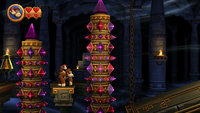
Jagged Jewels, a Key Temple level in Donkey Kong Country Returns and Donkey Kong Country Returns 3D contains some cylindrical, vertically-oriented Skewer-like obstacles, where they are found around the second Puzzle Piece, referred to as spiked shafts in the Prima guide[6]. These are encrusted with rows of sharp purple jewels, serving as spikes, and end with a large, similar pointy gem on their top. Much like the Skewers in the Mario games, spiked shafts are indestructible; they shoot vertically, moving back to their starting point after a strike and repeating the action, though they do not hit obstacles such as walls or ceilings. Their movements are quick, but they always signal their darting with a brief tremble and make a slashing noise when they activate. The first three spiked shafts move at succeeding times and are facing upward, while the next set of three spiked shafts alternate between pointing up and down and move slower than the other spiked shafts. The last two spiked shafts point upward.
Notably, two Puzzle Pieces are found at the tips of two spiked shafts, moving along with them.
Mario Party series
Mario Party: Island Tour
Five Skewers appear in the 4-player minigame from Mario Party: Island Tour, Kabob and Weave (Squish Kebab in the British English version of the game), where players must simply avoid them. They are inspired from their appearance in Super Mario 3D Land where they face the screen. At the beginning of the minigame, the middle Skewer hits Blue Toad. In the British English version of the game, they are referred to as "Spike Pillars".
Mario Party 10
Skewers reappear in Mario Party 10 in the 1 vs. 2 or 3 minigame Skewer Scurry, where the solo player controls them by selecting the direction they want them to activate in, while the other players need to avoid them by taking cover where the walls stop the Skewers. Skewers give a spinning warning to indicate what direction was pressed for the solo player. The solo player can additionally quickly change direction of which Skewers are going to activate to fake-out players. They appear as an obstacle in Chaos Castle on the Unlucky Spaces to take away ten Mini Stars from the player if the vehicle stops on it and launching the vehicle to the beginning of the other fork in the route. Once this happens, the Skewer in question retracts, causing the Unlucky Space in question to transform into a Green Space.
Mario Party Superstars
As Skewer Scurry returns as a playable minigame in Mario Party Superstars, Skewers reprise their roles in said minigame.
Super Smash Bros. series
Skewers from Super Mario 3D Land also appear in the stage based on the game, 3D Land, in Super Smash Bros. for Nintendo 3DS and Super Smash Bros. Ultimate, where they rise from the water and can destroy part of the stage's platforms (which resemble Switchboards), as well as hit any players who touch them. The Skewers deal a fixed 22% damage (regardless of the Spirit the player is using in Super Smash Bros. Ultimate) and relatively high knockback, which can potentially KO fighters. Three Skewers in the background are decorative and do not interfere with the stage; they spin around without moving up and down. In the stage's Ω and Battlefield form, the Skewers are seen in the background, having no impact on play.
WarioWare: Get It Together!
Skewers appear as an obstacle in the level three variant of the Super Mario World boss microgame in WarioWare: Get It Together!, part of 9-Volt's Nintendo Classics set. They behave as they do in Super Mario World.
Profiles
Super Smash Bros. for Nintendo 3DS / Super Smash Bros. Ultimate tips
- 3D Land: "Spike Pillars will pop out of the ocean at random. They can break lifts and deal a lot of damage to unlucky fighters."
Super Mario Maker 2
- "A spiked pillar that suddenly extends, with the ability to break the first row of blocks in its way (if any), before retracting back to its idle state. Skewers can be placed horizontally or vertically."
Gallery
Sprites and models
Super Mario Maker (Super Mario Bros. theme)
Super Mario Maker (Super Mario Bros. 3 theme)
Screenshots
Video games
Animation
Scans
Super Mario Kodansha manga, volume 8
Merchandise
Names in other languages
| Language | Name | Meaning | Notes |
|---|---|---|---|
| Chinese | 大狼牙棒[?] Dà Lángyá Bàng |
Big Thorn Club | |
| Dutch | Spijkerzuil[7] | Nail Pillar | |
| German | Dornensäule[?] | Spike Pillar | |
| Italian | Pilastro Spinato Rullo pungente[?] |
Spike Pillar Stinging roller |
|
| Korean | 가시기둥[?] Gasi Gidung |
Spiked Pillar | |
| Portuguese | Espeto[?] | Skewer | |
| Portuguese (NOE) | Poste com Espinhos[8] | Pole with Spikes | |
| Russian | Столб с шипами[?] Stolb s shipami |
Spiked Pole | |
| Spanish | Pilar Espinoso[?] | Spiny Pillar | |
| Spanish (NOA) | Brocheta (Super Mario Maker 2)[?] | Skewer |
References
- ^ M. Arakawa. Nintendo Mario Mania Player's Guide. Pages 142-143, 147.
- ^ von Esmarch, Nick. Super Mario 3D Land PRIMA Official Game Guide. Pages 49, 50, 88.
- ^ Super Mario Maker series in-game text (British English version)
- ^ The Cutting Room Floor: Super Mario World (SNES): Unused Levels. Retrieved September 3, 2020.
- ^ Bueno, Fernando. New Super Mario Bros. Wii PRIMA Official Game Guide. Pages 88, 121, 148, 149.
- ^ "The third Puzzle Piece hovers over a spiked shaft. […] The next Puzzle Piece is below a spiked shaft." — Michael Knight, Donkey Kong Country Returns Prima Official Game Guide. Page 161
- ^ Nintendo Nederland. (March 9, 2016). Super Mario Maker - Gesloten deuren! Spijkerzuilen! Roze munten! (Wii U). Youtube. Retrieved May 19, 2019.
- ^ Nintendo Portugal (March 9, 2016). Super Mario Maker - Portas fechadas à chave! Postes com espinhos! Moedas rosa! (Wii U). YouTube. Retrieved January 11, 2021.
- Hazardous objects
- Koopa Troop weapons
- Donkey Kong Country Returns objects
- New Super Mario Bros. objects
- New Super Mario Bros. 2 objects
- New Super Mario Bros. U objects
- New Super Mario Bros. Wii objects
- Super Mario 3D Land objects
- Super Mario Maker objects
- Super Mario Maker 2 objects
- Super Mario World objects
- Wario Land: Shake It! objects
